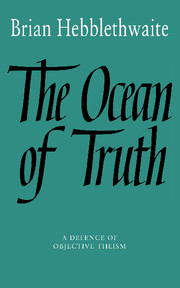Book contents
- Frontmatter
- Contents
- Preface
- 1 Christian belief in God
- 2 The ebbing of theistic faith
- 3 The interiorisation of faith
- 4 Theism in the modern world
- 5 The significance of Kant
- 6 The grounds of theistic belief
- 7 The question of truth
- 8 Religions – theistic and non-theistic
- 9 Life after death
- 10 The Christian Church and objective theism
- Appendix: The Church's ministry
- Notes
- Select bibliography
- Index
1 - Christian belief in God
Published online by Cambridge University Press: 06 July 2010
- Frontmatter
- Contents
- Preface
- 1 Christian belief in God
- 2 The ebbing of theistic faith
- 3 The interiorisation of faith
- 4 Theism in the modern world
- 5 The significance of Kant
- 6 The grounds of theistic belief
- 7 The question of truth
- 8 Religions – theistic and non-theistic
- 9 Life after death
- 10 The Christian Church and objective theism
- Appendix: The Church's ministry
- Notes
- Select bibliography
- Index
Summary
Like all the world religions, Christianity has taken and still takes many different forms. This is not only a matter of the major Church communions, Eastern Orthodox, Roman Catholic, Anglican and the numerous other Protestant denominations, with their more sectarian offshoots. Within each of these groups, Christian men and women manifest considerable differences both in belief and in practice, differences over how the Creed is understood – differences, that is, over what is actually believed – and differences in how the Christian way is envisaged – differences, that is, over what attitudes, practices, virtues, policies and ideals are actually enjoined. But even more basic and pervasive are the differences, again cutting across the denominations, between those Christians for whom Christianity is primarily a way of life, those for whom it is a distinctive set of cultic practices, and those for whom it is a set of very specific beliefs. These are not, of course, exclusive versions of Christianity. It is more a question of priorities. It is extremely unlikely, for instance, that Christian beliefs will be held without explicit or implicit commitment to a particular way of life. Maybe it is less unlikely that the Christian way will be embraced without assent to some at least of the beliefs of the Christian creeds. For the beliefs can be regarded as less important than, or as figurative or mythological expressions of, the moral and spiritual commitments that make up the Christian way.
- Type
- Chapter
- Information
- The Ocean of TruthA Defence of Objective Theism, pp. 1 - 16Publisher: Cambridge University PressPrint publication year: 1988



